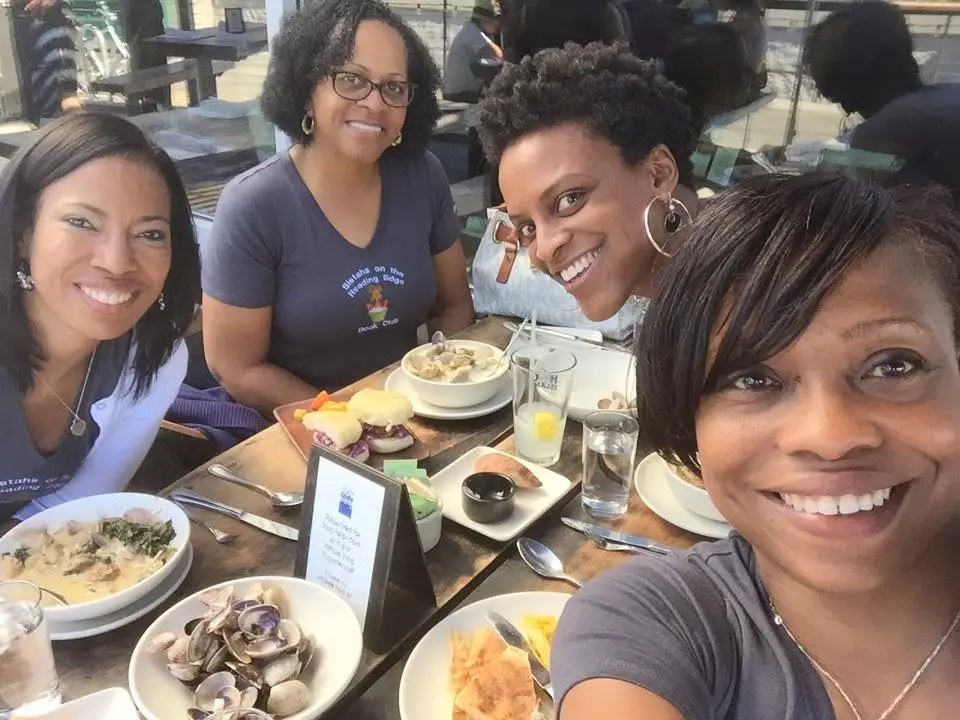When I think something is funny, I laugh HARD, and friends of mine who are actors always love having me in the audience, because they can pick me out from the stage, and they know that my contagious laughter will inspire other audience members to show their appreciation. Apparently, not everyone values loud laughter the same way.
What’s troubling is that whether someone values it is often divided down racial or cultural lines. A couple of days ago, a California woman named Lisa Renee Johnson and a group of women with whom she’s in a book club (10 black, one white), took the Napa Valley Wine Train. They were drinking wine, chatting, laughing, and having a great time. That is, until this happened:
Facebook Family, we have a problem!We sipped wine, enjoyed each other’s company but our trip is being cut short…this…
Posted by Lisa Renee Johnson on Saturday, August 22, 2015
Yup. The group got put off the train because their laughter was “annoying” and “this is not a bar.” Um…IT’S A WINE TRAIN. It’s a bar on wheels. That’s exactly what it is! The women were indeed escorted off the train and met by police when they got off the train. They were never held or charged with anything, and were eventually given a refund on their trip, but the simple act of having their entire group removed from the train for having too good of a time (while remaining in their seats and having no actual interaction with any other passengers and having paid for their train experience like everyone else) is humiliating and demeaning enough! Oh, and by the way, here’s one of the women in the group:
How can you kick her off the train for being too loud????
Posted by Lisa Renee Johnson on Saturday, August 22, 2015
She looks like a real rabble-rouser, huh? In addition to the passenger, a maître d’ also asked said they were making too much noise, but when asked who complained, the maître d’ said that “people’s faces are uncomfortable.”
Johnson said in a statement to the Napa Valley Register:
[Napa Valley Wine Train] need[s] to look at their own policies. I feel like we as a group were made to bear the consequences of their not having policy on seating their customers. They need to give sensitivity training to their staff immediately. We want a public apology for how they treated us and for the public humiliation, which is unacceptable for anybody.
Meanwhile, the Napa Valley Wine Train has a very different view of things. They posted the following statement about the incident, then promptly deleted it. Luckily, Johnson got a screencap before that happened:
Posted by Lisa Renee Johnson on Sunday, August 23, 2015
I wasn’t there during that train ride so I don’t know exactly how it all went down. All I do know is that a customer complained that a group’s laughter was “annoying” because “this is not a bar.” I know that the person who complained was white. I know that the group that was escorted off the train was mostly black. I know that Johnson and her group were members of a book club, and that there was an elderly woman in their party. And I know that the Wine Train’s now-deleted accusation of “verbal and physical abuse,” by these women toward the staff and other passengers seems insane when I look at these women. But as I said, I wasn’t there.
Something that stands out to me whenever stuff like this happens is that we often talk about the organization (ie: the Napa Wine Train) or the police who get involved, but there’s a very important part of all of these stories that tends to get overshadowed in the ensuing discussion – the first phone call. There’s always that first call, or that first complaint, that sets everything in motion, and whether it’s a white woman on a train who finds a group of black women laughing distasteful, or a white person at a Wal-Mart who sees a young black man shopping and carrying an air rifle he’s going to purchase thinking the young black man looked “suspicious,” or a white person calling to report “prostitution” when they see a black actress making out with her white boyfriend in a car, it’s always a white person…nervous. But about what exactly?
It’s always “uncomfortable” white people making these phone calls about things that aren’t actual wrong-doing, but that nonetheless inspire an irrational fear in them so intense that they feel the need to get police involved. Systemic racism goes beyond police departments and beyond businesses like the Wine Train. It’s individual white people watching individual people of color standing around existing and feeling threatened by that.
When I was in college, I went to a Broadway play with a friend of mine who’s half Jamaican. The play was a comedy, so when there were jokes, we laughed. And, being us, we laughed LOUDLY. We were paying attention to the play and laughing at punchlines – you know, the way you’re supposed to. So, imagine our surprise when, at intermission, the older white woman in front of us turned around annoyed and asked us to “stop laughing so loud.” We were stunned into silence, because we didn’t even know how to respond to that. What else are we supposed to do when we think something in a play we’re watching is hilarious? Stifle it? Was it our fault that she 1) didn’t get the jokes, or 2) was raised to believe she had to repress her enjoyment?
Perhaps if more white people associated with people outside their own cultures and experiences, the simple act of laughing wouldn’t seem so shocking.
(via Think Progress; Images via Lisa Renee Johnson‘s Facebook page)
—Please make note of The Mary Sue’s general comment policy.—
Do you follow The Mary Sue on Twitter, Facebook, Tumblr, Pinterest, & Google +?








Published: Aug 24, 2015 08:25 pm